I have read a lot of roleplaying game (RPG) rulebooks this year, at least one every month. I owe this staggering achievement to the tabletop roleplaying game (TTRPG) book club, Bookwyrms. Bookwyrms is hosted by the Storytelling Collective, a group that provides online classes and resources for RPG writers. Each month, members are assigned an RPG rulebook or starter set to read cover-to-cover.
That might sound like a lot, and it is (did you know 2nd edition Pathfinder is 640 pages long?), but it is good practice for individuals looking to run a game.
“So you’re getting ready to GM a new RPG for the first time… Step 1: Read the rulebook. Cover to cover. I’m afraid there’s no cheating around this and no shortcuts. If you’re lucky, the RPG you’ve chosen will have a well-organized rulebook…”
-Justin Alexander, So you Want to Be a Game Master p459
Last month we read through the starter set for RuneQuest: Roleplaying in Glorantha (RQG). I have held back on talking about the RPGs I have read so far because I felt that talking about games I have not had a chance to play would not be doing my due diligence. But then I realized that if reading 200+ pages of what amounts to a technical manual does not qualify me to comment on a game, then maybe this whole roleplaying thing is just a huge waste of time and we should stop dealing with it altogether. So without further ado, I give you my first impressions of RuneQuest.
What is a RuneQuest?
RuneQuest is a bronze-age fantasy game where you pledge your loyalty to clan and cult, placate surly gods, and navigate complex allegiances while maintaining your personal relationships, honoring your oaths, and protecting your homestead.
It is also, like many old-fashioned RPGs, about crawling through dungeons and bopping nasty monsters on the head, but it takes a unique approach to these scenarios. The nasty monsters often have families that will be mighty upset with you for bopping their kin, for example, and they are more likely to take you prisoner and ransom you back to your own family than kill you outright.
The original RuneQuest was released in 1978, just four years after Dungeons & Dragons, making it one of the oldest RPGs on the market. The game was written and designed by Greg Stafford, a legendary name in the TTRPG space who sadly passed away in 2018. RuneQuest is currently published by Chaosium, the company Greg Stafford founded nearly fifty years ago.
The history of RuneQuest is messy, with the rights to the game passing through several hands over the years. The latest edition of RuneQuest was released in 2018, just before Greg Stafford’s death, and is the seventh version of the game, though only the third published by Chaosium.
What sets RuneQuest apart more than anything is its setting, Glorantha. Glorantha has always been tied to RuneQuest, even when the two were not synonymous. The four iterations of RuneQuest not published by Chaosium each had a generic fantasy setting, but there were always supplements allowing for play in Glorantha. The latest edition of RuneQuest represents the first time the world and mechanics have been intrinsically linked in decades.
Glorantha is deeply rooted in classic mythology. Gloranthans worship many gods, all of them very real and closely tied to the land where they are worshipped. Everyone belongs to at least one cult, most of which coexist without tension. The gods aid heroes in their quests, and with enough time and effort heroes can themselves attain the mantle of godhood.
Glorantha contains a vast array of cultures with their own languages and traditions, including non-humans such as dragonnewts and trolls. There are no truly “evil” races in Glorantha, just different societies with their own needs and agendas. The closest thing to an antagonistic force is the Lunar Empire, a Roman-themed society bent on spreading their empire across Glorantha, but even these people are treated with nuance and complexity.
The runes from which RuneQuest gets its name are powerful archetypes that give all things meaning. These runes embody elements such as fire, water, and earth as well as concepts such as truth and death. Gods are said to be manifestations of the runes, and anybody can invoke the runes to cast spells. In fact, everyone in Glorantha can use magic to some extent.
Player characters in RuneQuest have affinities with specific runes, a set of driving passions, as well as a clan and family to which they owe loyalty. These factors give each character a rich and distinct personality, as well as a built-in backstory, which guides players in how to play them, encouraging them to literally “play the role” in a way many roleplaying games do not.
Who is the Starter Set For?
Starter sets, as the name implies, are products meant to introduce new players to a game. They are often cheaper alternatives to buying the core rulebooks, contain condensed versions of the rules and lore, and are designed to allow players to pick up and play a game as quickly as possible.
The RuneQuest Starter Set, released in 2021, costs $30 and runs 180 pages over four booklets. The RuneQuest Rulebook costs $55 and runs for 448 pages. This does not include the Bestiary or Game Master resources that also make up the core ruleset.
The RuneQuest Starter Set offers an astonishing amount of content. The four core booklets present the rules, an overview of Glorantha and the city of Jonstown, a solo adventure that can be played without other players, and three adventures. There are fourteen pre-generated (pre-gen) characters — a staggering amount for a set like this —each featuring unique art, abilities, and backgrounds covering the wide range of character types you can play in RuneQuest.
The set also comes with some reference sheets and a set of dice. As an added bonus, each of the four booklets feature part of a map on the back which, when assembled, reveals the geography of Dragon Pass, the area of Glorantha where all of the included adventures take place.
The quality of this starter set is head and shoulders above a lot of the competition and offers a decent on-boarding experience. The solo adventure, or SoloQuest, is a wonderful tool for getting into the world of the game and allows you to experience a RuneQuest adventure without the stress and bother of organizing a time to play with friends (the greatest barrier to any roleplaying game). You simply open the book and make choices that advance the story, interactive fiction-style. While you play, the adventure teaches you the mechanics. By the time you finish your first play-through, not only will you have experienced Glorantha for yourself, but you will also have a firm grasp of the core mechanics.
Not enough RPGs use solo adventures to onboard players. The Pathfinder and Starfinder beginner boxes each have a solo adventure, but they only run 20 passages long and are over before you get any real sense of the world. RuneQuest’s SoloQuest is 200 passages long, and features many facets of the world and mechanics, with lots of incentives to replay the scenario and discover different endings.
As touched on before, the world of Glorantha is rich and unique, and there is a refreshing emphasis on managing relationships and navigating social situations. The world is full of trolls looking for work, battle bison and riding zebras you can take into battle, forgotten gods that can be bargained with, and magical healers that can bring back the dead for the right price (assuming that you died less than two weeks ago). The world is brought to life through solid art and sprawling maps that give you only a taste of what the world of Glorantha has to offer.
Not All That Glitters is Bronze
RuneQuest is a game with nearly fifty years of history, and the Starter Set has the unenviable task of being approachable to new players while appealing to older players who want this new game to be compatible with their old materials. The Starter Set, despite the engaging world and wealth of materials, feels bogged down by the game’s clunky mechanics and more content than can possible be summarized in 180 pages of material.
For one thing, playing the game requires consulting multiple tables for opposed actions, critical hits and fumbles, and parrying, the last of which is explained in a five-by-five table that takes up an entire page. This over-reliance on tables slows down the game and feels unnecessary considering that Chaosium’s other major RPG, Call of the Cthulhu, uses the same core system as RuneQuest, but streamlines the rules considerably.
The Starter Set also attempts to condense the lore of Glorantha into a 64-page booklet, another gargantuan task. Rather than cover everything, it opts to touch on the basics of the mythology and dedicate the majority of its page count towards describing the city of Jonstown, the starting location for many of the adventures in the Starter Set. This is a good idea, as it places emphasis on material that players will actually interact with in a regular session. There is enough material on the people and locations within Jonstown to power many roleplaying sessions.
However, I find myself wishing that the Starter Set had spent just a little more time on the greater mythology and a little less on the minutiae of Jonstown. For example, the lore booklet describes a major event in which an occupying force, the Lunars, were driven out of Dragon Pass by the appearance of a massive dragon. This event, known as the Dragonrise, is very recent at the time of the included adventures and has huge ramifications for the world of Glorantha, but is described in a single paragraph, with the origins of the dragon left unclear. Meanwhile, there is half a page dedicated to describing the layout of the average Jonstown home in meticulous detail. While the amount of detail is admirable, some theories or rumors about the Dragonrise would have provided more tension and adventure hooks for new players than anything found in the Jonstown section.
Lastly, the RuneQuest Starter Set was released in 2021, during the height of a global pandemic, which shows in the quality of the writing. I firmly believe that the folks at Chaosium did the best they could with the resources they had at the time, and the Starter Set is still head and shoulders above much of its competition, but there are too many little mistakes that can act as stumbling blocks for new players.
The character sheets have erroneous and conflicting information regarding armor scores and abilities, mistakes which will lead many new players to unwarranted early deaths. The parrying rules, despite taking up an entire page, are too brief and lack important context, making them easy to misunderstand. There are long, drawn-out examples of play that introduce concepts before they are explained by the rules, and some rules that desperately need some clarifying examples that are given none. While not game-breaking by any means, these mistakes create unncessary friction for players looking to learn an already complicated new game.
Right Place, Wrong Foot
The RuneQuest Starter Set is an excellent purchase at $30 and is by far the best way to get into RuneQuest. However, it falls short of being a perfect on-boarding experience by creating too many points of friction that can frustrate, confuse, or overwhelm new players. I would not recommend RuneQuest as your first RPG experience unless the setting really captures your interest and you know someone willing to teach you the rules. That said, for experienced roleplayers looking for something other than the traditional medieval, Tolkien-esque fantasy, RuneQuest is a fantastic choice worth checking out.
Next time…
The year is wrapping up, and I think it’s time to take stock. There will be presents and there will be thoughts. Stay tuned.





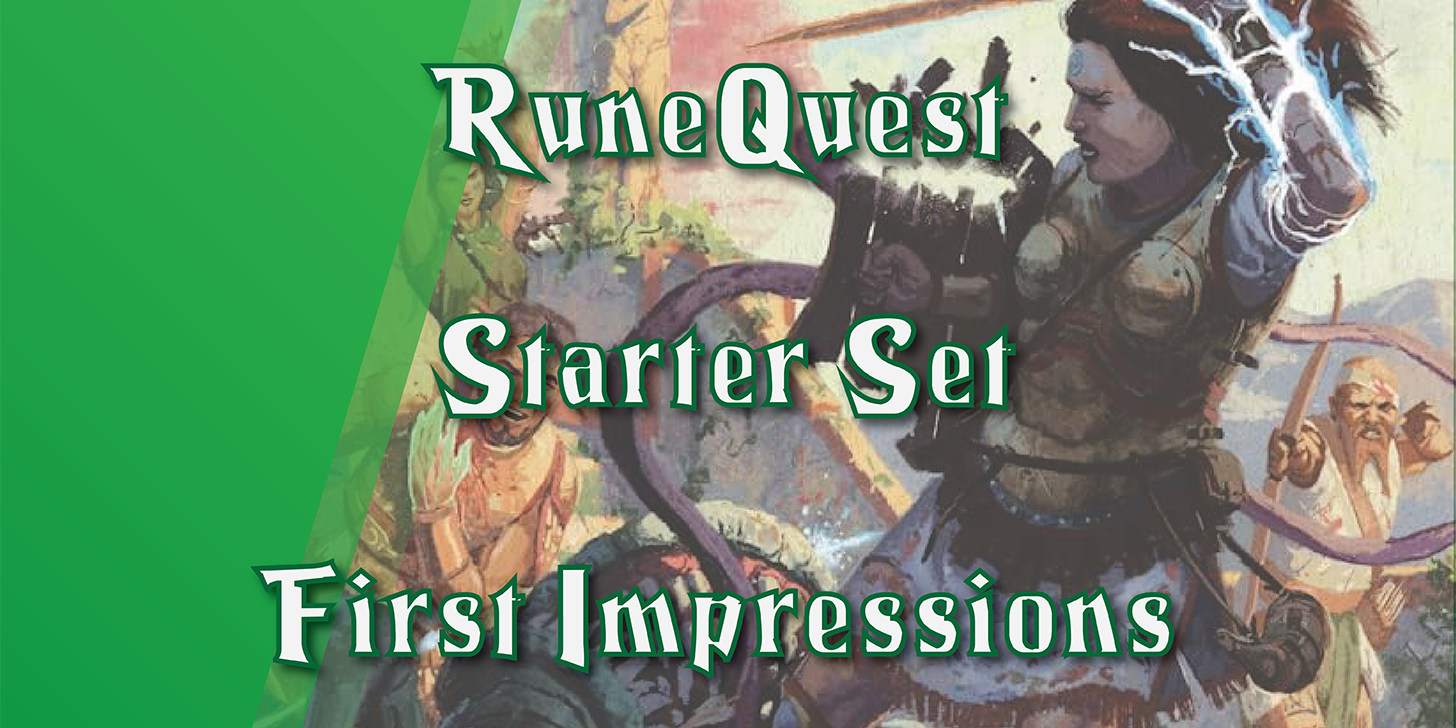
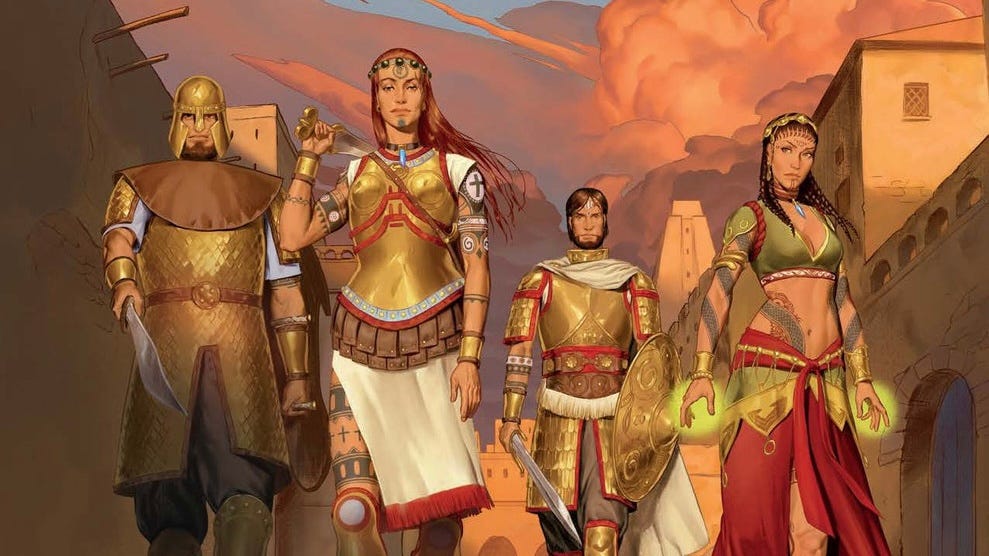
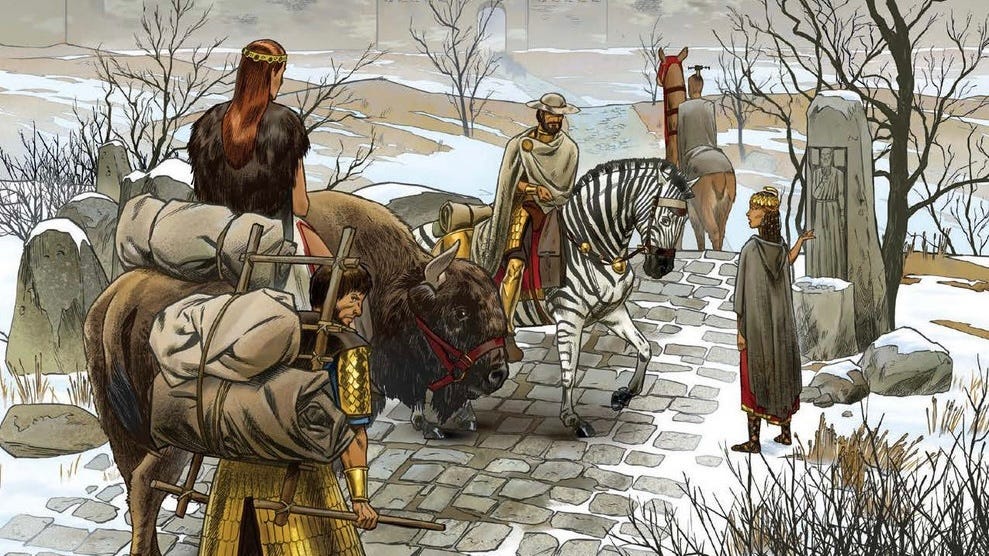
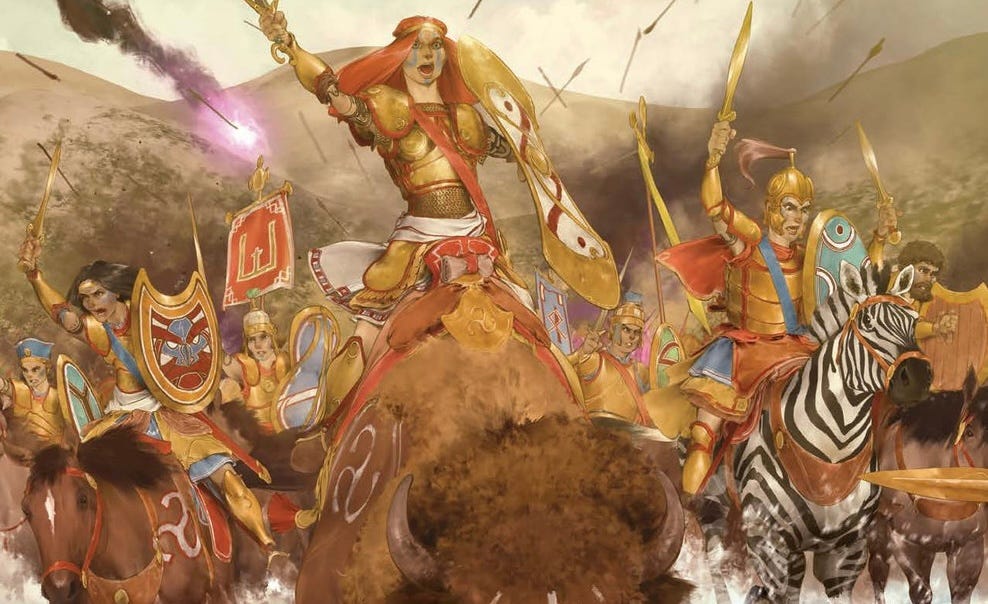


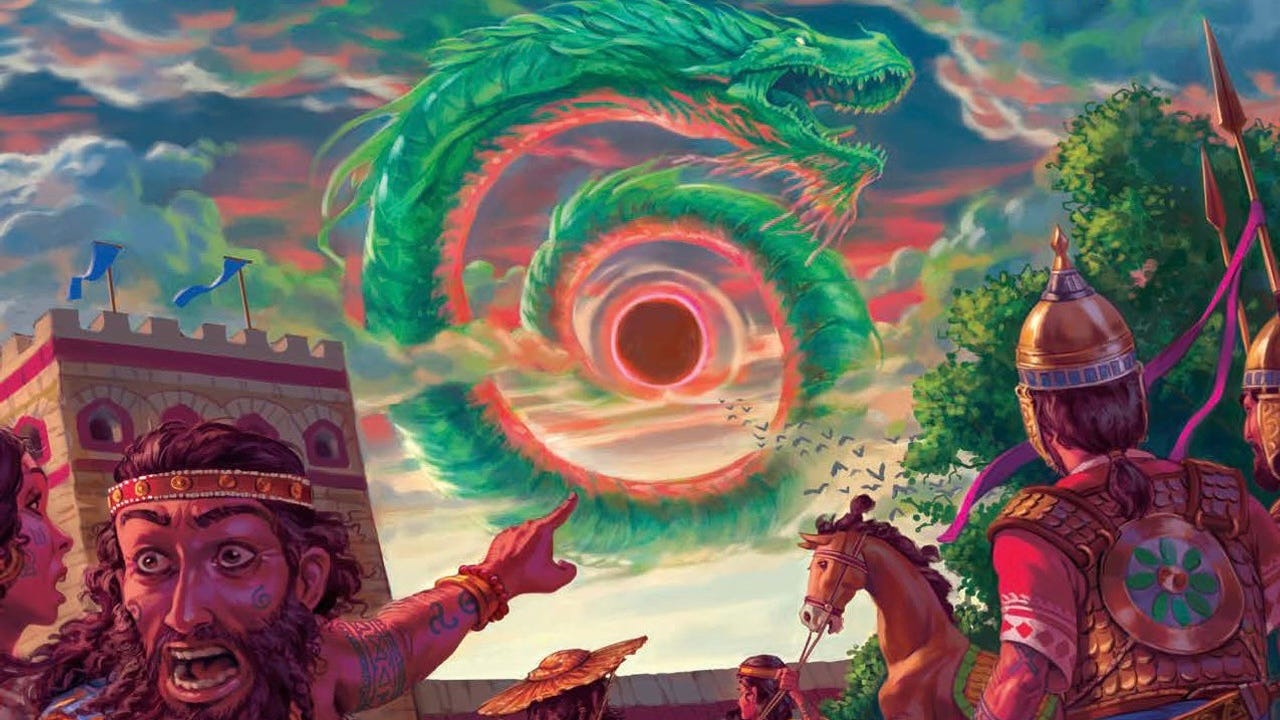
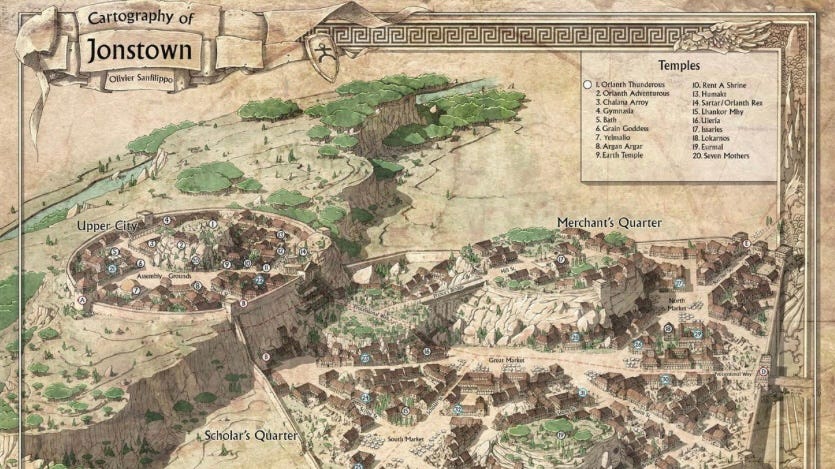
Dude - great review of the RuneQuest starter set! I agree with you about having weighty solo adventures to introduce new players to a system - I'm tempted to pick this up just to play their 200 passage SoloQuest!